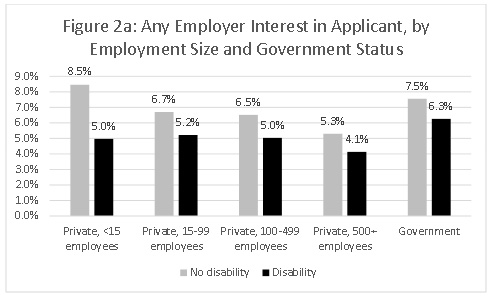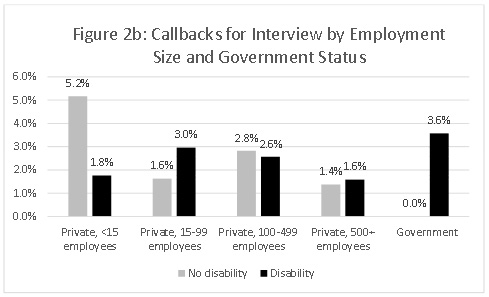If you’re a hiring manage and you’ve been getting a lot of resumes lately, this might not have anything to do with an improving economy. It might instead be due to the blizzard of academic research that’s conducted by sending out thousands of resumes with tiny differences in order to figure out how hiring managers respond to race/college/political party/hobbies/etc. The latest experiment is to see how hiring managers respond to disabilities, and the results are more interesting than you might think. Here are the basic results:

No surprise here. If you indicate that you have any kind of disability, there’s less interest in hiring you, and these results are consistent across all sizes of companies—though they’re more pronounced in small companies—and across both private-sector and public-sector employers. But now take a look at this:

When it comes to getting an actual callback, small companies are far less likely to respond if you have a disability. But larger companies show little discrimination at all. In fact, many of them are more likely to call you back if you have a disability. The most dramatic difference is among government hiring managers: if you don’t have a disability, no callback. If you do have a disability, the rate of callbacks is the highest in the study. The authors provide the most obvious explanation:
Given that small employers are not subject to the ADA, this result suggests that small employers are engaging in discrimination while the ADA is constraining discriminatory behavior of medium and large employers. The story is complicated, however, by the lack of clear changes in employer responses at the ADA employment threshold…and by consideration of state DDL’s….This latter result may be due to a lack of knowledge of state laws among small employers, while the federal ADA is much better known. Large employers are more likely to have formal HR departments that will be aware of both the ADA and state requirements, and may be more likely to have prior experience in hiring people with disabilities so they are more comfortable in considering applicants with disabilities.
So the picture is complicated, but the most likely interpretation is that ADA has been fairly successful in the job market. If you pass a law that forbids discrimination, and then enforce it, you get results. It’s yet another example of big government working pretty well.














